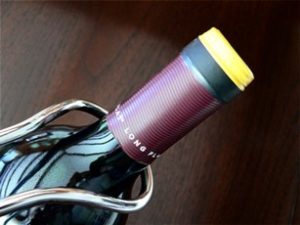Wine Allergies?

Wine is in a category of its own when you think of its history, popularity, and creation. The act of creating wine has been called a science and an art with the goal to delight the senses. What if you drink wine then your body reacts with headache, nasal stuffiness, digestive problems, or anaphylactic shock? Grapes may not be the culprit. There are a handful of undisclosed ingredients that may reside in your wine that can cause physical discomfort and allergic reactions.
Eggs, fish, shellfish, gelatin, wheat and milk products are commonly used in the wine making process although consumers are unaware since the United States does not require ingredient labeling or allergen warnings for alcoholic beverages. The word vegan on the label means there are no animal products but there could be the presence of a wheat protein if used in the fining process. Biodynamic wineries tend to be vegan and gluten free while being good stewards of the earth during the entire process of creating wine.
There are countries that are or will be requiring allergen labeling on wine bottles. Australia, Hong Kong, and New Zealand have already instituted allergen labeling while Canadas recent legislation to label wines with food allergens will go into effect in August of 2012.
How are these potential allergens used in the wine making process?
Allergens can be added during fining, which is the process of clarifying wine, by removing undesirable odors, colors, and flavors. For example, reducing a strong oak flavor or clarifying the appearance. The fining agents will attach themselves to the various impurities or solids in the wine and drop to the bottom of the barrel or tank. As the wine is racked or moved from one barrel or tank to another, the sediment at the bottom will stay thus is not considered a part of the finished wine. The filtration, racking, and clarifying processes are supposed to remove sediment and fining additives.
One of the most widely used fining agents is bentonite (a type of clay) which is vegan and gluten free and often used when making biodynamic wines. Other fining agents are egg white, egg shell, casein (milk), hydrolyzed wheat gluten isolate, chitin (made from crustacean), gelatin (from animal or fish protein), isinglass (substance from fish bladders, often sturgeon) and a host of other synthetic and natural materials.
Lysozyme, derived from egg whites, is used to control lactic acid bacteria in the wine. It can be added at several different points in the wine making process. The lysozyme is not removed nor settles so it stays in the wine.
Are there allergens in your bottle of wine?
Studies measuring the presence of allergens have had mixed results. In a study conducted in Australia in 2006 no measurable allergens were found.1 Contrary to the Australian study, the European Food Safety Authority showed there could be adverse allergic reactions from wine due to lysozyme additives.2
The amount of allergens used in the wine making process depends on the quality of the vintage. Although some vintners may prefer particular fining agents for their white wines and others for their red wines none of the wine making processes are exactly alike from vintage to vintage, region to region and winery to winery. Each harvest season the grapes are assessed for their quality and quantity followed by artfully and scientifically developing the wine with the right amount and type of fining agents. This is a dilemma for the wine enthusiast who also has food allergies since it is not known whether trace elements remain after bottling.
Before you purchase wine you should be aware that some vintners believe the filtration process reduces flavor. Bottles of unfiltered wine will most likely contain allergens used in the production process. Unfiltered wines tend to be high end or expensive varieties. The wine label may or may not disclose whether the wine is unfiltered. This information further complicates choosing a safe wine.
How do you choose a safe bottle of wine?
There are wineries that are dedicated to providing wines without any fining agents or lysozyme enzymes. For wine enthusiasts who have food allergies to egg, milk, fish, shellfish or wheat look for vegan, gluten free, or biodynamic wines. We found two California vintners who produce vegan, gluten free, and biodynamic wines; Frey Vineyards of California, and Maysara Winery in Oregon. We contacted Naseem Momtazi at Maysara Winery who shared her familys philosophy. They believe the wine should be untouched (by additives, fining agents, and so on) so they can provide consumers with the purest form of grapes and wine she told us.
For other wineries that specialize in vegan or gluten free wines search the web for vegan and gluten free wines or contact your favorite winery for information on their production process and your concerns.
- Potential food allergens in wine: double-blind, placebo-controlled trial and basophil activation analysis.
- Scientific Opinion related to a notification for the Oenological Products and Practices International Association (OENOPPIA) on lysozyme from hens egg
- What are food allergies?
- Food allergy and food intolerance?
- Are food allergies increasing?
- What is anaphylaxis?
- Learn about food allergen labeling
- What are most common food allergies?
Category: Food-allergies
